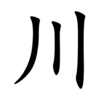川
| ||||||||
Translingual
Han character
| Stroke order | |||
|---|---|---|---|
| Stroke order | |||
|---|---|---|---|
 | |||
川 (Kangxi radical 47, 巛+0, 3 strokes, cangjie input 中中中 (LLL), four-corner 22000, composition ⿲丿丨丨)
Derived characters
Descendants
- つ (Hiragana character derived from Man'yōgana)
- ツ (Katakana character derived from Man'yōgana)
References
- KangXi: page 323, character 23
- Dai Kanwa Jiten: character 8673
- Dae Jaweon: page 624, character 7
- Hanyu Da Zidian (first edition): volume 1, page 32, character 2
- Unihan data for U+5DDD
Chinese
| simp. and trad. |
川 | |
|---|---|---|
| alternative forms | 巛 | |
Glyph origin
| Historical forms of the character 川 | |||||
|---|---|---|---|---|---|
| Shang | Western Zhou | Warring States | Shuowen Jiezi (compiled in Han) | Liushutong (compiled in Ming) | |
| Oracle bone script | Bronze inscriptions | Bronze inscriptions | Chu slip and silk script | Small seal script | Transcribed ancient scripts |
 |
 |
 |
 |
 |
 |
Etymology
The Middle and Old Chinese reconstruction of this word is phonologically problematic (STEDT):
- Karlgren (1957) notes that the Middle Chinese form is irregular based on evidence from Shijing rimes.
- Based on velar contacts in the same phonetic series, e.g. 巛, 甽 and 訓, Baxter (1992) and Schuessler (2007) reconstruct the word with a velar initial (Handel, 1998; Sagart, 1999), which undergoes irregular palatalization in the development to Middle Chinese (Baxter, 1992).
- Based on other characters in the same phonetic series, e.g. 順 and 馴, Sagart (1999), and later, Baxter and Sagart (2014), reconstructs 川 with a lateral initial and suggests that only a *t- prefix would account for the Middle Chinese initial /t͡ɕʰ/.
Schuessler (2007) relates this word to Proto-Sino-Tibetan *kl(j)u(ŋ/k) (“river; valley”), whence 江 (OC *kroːŋ, “river”), 谷 (OC *kloːɡ, “valley”), Tibetan ཀླུང (klung, “river”), Burmese ချောင်း (hkyaung:, “stream”). STEDT notes that this does not account for the *-n coda.
STEDT instead compares it to Proto-Sino-Tibetan *m-t(w)əj-n ~ m-ti-s (“water; fluid; liquid; river; soak; spit”), whence 涕 (OC *tʰiːlʔ, “tears”), Proto-Kuki-Chin *tuj (“water; fluid; liquid”), Chepang तीः (“water; rain; river”); this depends on a reconstruction with a dental initial and requires positing an *‑n suffix not present in Tibeto-Burman languages.
Pronunciation
Definitions
川
- river; stream; brook
- 川流不息 ― chuānliúbùxī ― to flow continuously
- Short for 四川 (Sìchuān, “Sichuan Province, China”).
- 川菜 ― chuāncài ― Sichuan cuisine
- plain
- 平川 ― píngchuān ― plain
- road
- Synonym of 汆 (cuān, “to boil food for a short time in boiled water”).
- Alternative form of 穿 (chuān).
- (Internet slang) Short for 川普 (Chuānpǔ, “Donald Trump”).
- a surname
Compounds
|
References
- “川”, in 漢語多功能字庫 (Multi-function Chinese Character Database), 香港中文大學 (the Chinese University of Hong Kong), 2014–
Japanese
Readings
Compounds
- 川上 (kawakami, “upstream”)
- 川下 (kawashimo, “downstream”)
- 川岸 (kawagishi, “river bank”)
- 川口 (kawaguchi, “mouth of river”)
- 川崎 (Kawasaki, “Kawasaki”)
- 川瀬 (kawase, “rapids”)
- 川蝉 (kawasemi, “kingfisher”)
- 川端 (kawabata, “riverbank”)
- 川縁 (kawabuchi), 川縁 (kawaberi, “riverside”)
- 川獺 (kawauso, “otter”)
- 川嫁 (kawayome, “river nymph”)
- 川原 (kawara, “riparian plain, flats alongside a river”)
- 川柳 (senryū, “comic haiku”)
- 小川 (ogawa, “brook”)
- 河川 (kasen, “rivers”)
- 山川 (sansen, “mountains and rivers”)
- 滝川 (takigawa, “rapids”)
- 谷川 (tanigawa, “mountain stream”)
- 堀川 (horikawa, “canal”)
- 淀川 (Yodogawa, “Yodogawa River”)
- 川下り (kawakudari, “going downstream”)
- 川沿い (kawazoi, “along the river”)
- ドン川 (Don-gawa, “Don River”)
- 天の川 (Ama no gawa, “Milky Way”)
- 江戸川 (Edogawa, “Edo River”)
- 角川 (Kadokawa, “surname”)
- 河川敷 (kasenshiki, “riverbed”)
Etymology
| Kanji in this term |
|---|
| 川 |
| かわ Grade: 1 |
| kun’yomi |
| Alternative spelling |
|---|
| 河 |
From Old Japanese kapa[1] from Proto-Japonic *kapa.[2]
Alternative forms
Synonyms
- 河川 (kasen)
References
- National Institute for Japanese Language and Linguistics (2020), “Old Japanese kapa”, in Oxford-NINJAL Corpus of Old Japanese
- Stewart A. Curry. (2004) Small linguistics: phonological history and lexical loans in Nakijin dialect Okinawan. http://hdl.handle.net/10125/11526
- 1974, 新明解国語辞典 (Shin Meikai Kokugo Jiten), Second Edition (in Japanese), Tōkyō: Sanseidō
Korean
Etymology
From Middle Chinese 川 (MC t͡ɕʰiuᴇn).
| Historical Readings | ||
|---|---|---|
| Dongguk Jeongun Reading | ||
| Dongguk Jeongun, 1448 | ᄎᆑᆫ (Yale: chywèn) | |
| Middle Korean | ||
| Text | Eumhun | |
| Gloss (hun) | Reading | |
| Hunmong Jahoe, 1527 | 내〯 (Yale: nǎy) | 쳔 (Yale: chyèn) |
Pronunciation
- (SK Standard/Seoul) IPA(key): [t͡ɕʰʌ̹n]
- Phonetic hangul: [천]